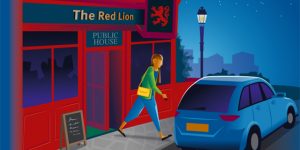Drink driving
 The offences associated with drink driving are Excess alcohol (drive/attempt to drive) and Excess alcohol (in charge). Both these offences come under section 5 of the Road Traffic Act 1988.
The offences associated with drink driving are Excess alcohol (drive/attempt to drive) and Excess alcohol (in charge). Both these offences come under section 5 of the Road Traffic Act 1988.
There are strict alcohol limits for drivers in the UK. In England, Wales and Northern Ireland, the alcohol limit for drivers is:
- 35 micrograms of alcohol per 100 millilitres of breath
- 80 milligrams of alcohol in 100 millilitres of blood
- 107 milligrams of alcohol per 100 millilitres of urine
The legal alcohol limit for drivers in Scotland is lower in all three categories.
What happens if a person is caught drink driving?
The police have the right to ask anyone who is driving, attempting to drive or in charge of a vehicle who they suspect has been drinking to take a breath test. Anyone who refuses to supply a breath sample without reasonable excuse will be arrested. If a person fails the breath test they will be taken to a police station for a second breath test. If that returns a positive result, that person will be charged with drink driving. Failing to take the roadside test or police station test without reasonable excuse is an offence.
Anyone caught over the limit in their car, even if they are not actually driving it, could still be charged under excess alcohol (in charge).
Sentencing
Parliament sets the maximum (and sometimes minimum) penalty for any offence. When deciding the appropriate sentence, the court must follow any relevant sentencing guidelines, unless it is not in the interests of justice to do so.
What is the penalty for drink driving?
If a person is found guilty of drink driving they could be banned from driving, fined or even sent to prison. The sentence depends on the severity of the offence and is decided by a magistrates’ court.
The maximum sentence for excess alcohol (drive/ attempt to drive) is an unlimited fine and/or six months’ custody.
If the offence was drive/ attempt to drive, the driver will also lose their licence for at least 12 months. The court may offer a reduced ban if the driver completes a drink-drive rehabilitation scheme (DDRS) course.
If the offence was excess alcohol (in charge), the maximum sentence is a fine up to £2,500 and/ or three months’ custody. The offender may lose their licence or receive 10 points.
Find out more about the different types of sentence the courts can impose.
How is the sentence worked out?
Sentences are based on the level of alcohol found from testing. The court also considers adjustment based on any aggravating or mitigating factors.
Aggravating factors may increase the severity of the sentence. Examples include:
- previous convictions relating to the nature of the offence
- if the driver was carrying passengers
- evidence of an unacceptable standard of driving
- if the driver was involved in an accident
- if there was a high level of traffic or pedestrians in the vicinity
Mitigating factors may reduce the severity of the sentence. Examples include:
- no previous convictions or relevant/recent convictions
- if it was a genuine emergency
- if the driver’s drinks had been spiked
- if the distance driven was very short
- if the driver showed remorse or was of good character
- if the driver has a serious medical condition, mental disorder or learning disability
- if the driver is the sole or primary carer for dependent relatives
If the defendant pleads guilty, they will also receive a reduced sentence, although not a reduced disqualification period.
You can find out more about how sentences for drink driving are calculated depending on the offence type. See the sentencing guidelines for:
Useful information
- Sentencing guidelines for use in magistrates’ courts
- Sentencing guidelines for use in the Crown Court
- Research and resources
- Consultations
- News and articles
- You be the Judge – an interactive guide to sentencing
- Going to court
- Crime, justice and the law on GOV.UK
- Sources of legal advice
The information on this page is not a complete legal analysis of the offences and is not a substitute for legal advice. The law will be different in Scotland and Northern Ireland.